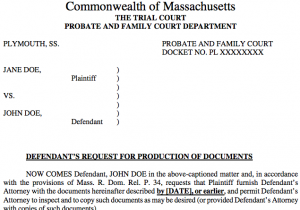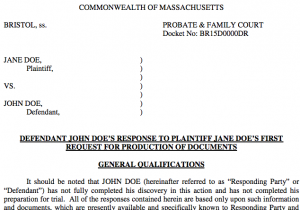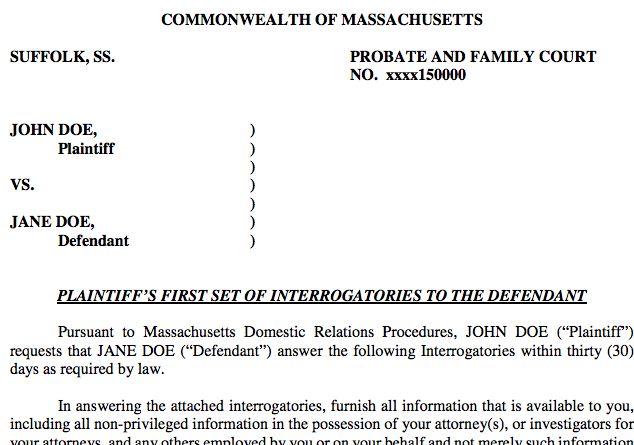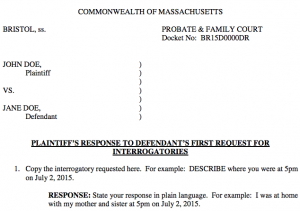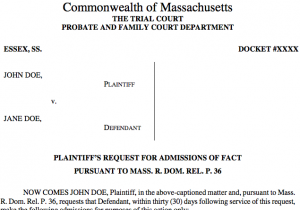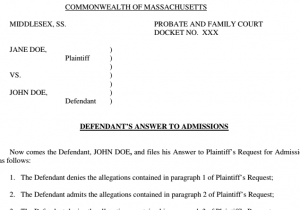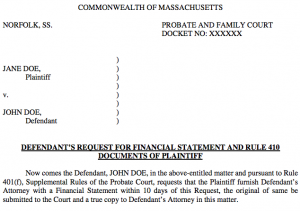Discovery In Boston Massachusetts Divorce Matters
DISCOVERY SPECIALISTS FOR DIVORCE MATTERS – FREE CONSULTATIONS
Divorce Discovery Templates and FAQs
Discovery in divorce cases is governed by the Massachusetts Rules of Domestic Procedure 26-37 and follow similarly to the federal rules of evidence that many states have adopted.
Here, “Discovery” means the gathering of information through legally permissible ways during a civil court divorce action, which may include sending a demand for inspection of documents and things, taking depositions, sending interrogatories, demanding physical or mental examinations, sending request for admissions, and other procedures.
The information that can be gathered in divorce cases through discovery procedures is very broad. Basically, anything that is relevant to the case may be discovered (there are some exceptions, such as information that is privileged between a person and their lawyer). The general phrase that determines whether information is discoverable is whether the information “is reasonably calculated to lead to the discovery of admissible evidence.”
The courts ensure that discovery is responded to by the receiving party and there may be severe sanctions for a party (or even non-party) failing to respond to discovery.
WHEN IS DISCOVERY STARTED?
Discovery can be started in a case right away by either party. (Rule 26(d)). In many other states, the plaintiff in the case must allow the defendant time after they are served with the summons to get involved in the case before they are slammed with discovery. That is not the case in the Commonwealth.
General Rule: Discovery must be responded to within 30 days
However, the defendant is permitted extra time to respond from the normal 30 days to 45 days if the discovery is propounded along with the divorce summons and complaint (meaning that a defendant does not have to respond until the expiration of 45 days following the date a summons/complaint is served upon them). The court may also prescribe different timelines for responding to discovery, or the parties themselves may establish deadlines.
Importantly, there is no mandate that discovery must be conducted by either party in a divorce case in Boston, Massachusetts. Many cases reach a conclusion without the necessity of discovery.
WHEN IS DISCOVERY NEEDED?
Discovery is needed in many cases, but not every case. We estimate that approximately 50-60% of cases require the use of some type of discovery, which may include very simple and narrowly-tailored requests. Because discovery means information gathering, discovery is only needed when a party does not have all the information he or she needs to plan for conclusion of the case.
For example, discovery might be a useful method to obtain information when:
- A spouse is self-employed and not disclosing his or her income.
- Third parties with relevant information to the divorce are not willfully cooperating to provide information.
- A spouse is hiding assets.
- A spouse has not provided all his or her Rule 410 financial disclosures.
- The other party is being evasive in his or her answers to questions.
- Money is disappearing.
WHEN MUST DISCOVERY BE COMPLETED?
Deadlines for completion of discovery are set in every case by the judge, usually at the outset of the case at the Case Management Conference or at the latest at the Pre-Trial Conference. The judge will provide the timeline for completion of discovery as part of its orders at one of these hearings.
If the discovery is not completed by the deadlines, parties may agree (stipulate) to extend the deadline for completion of discovery. Alternatively, either party may file a motion with the court and request that the deadlines for discovery be extended to some other time to allow that party to conduct relevant discovery.
HOW DO I RESPOND TO A DISCOVERY DEMAND?
Responding to a discovery demand should be done extremely carefully. We have provided templates for you to view on this page.
There are also mechanisms for a responding party to discovery to object to certain discovery demands. For example, if the discovery sought is harassing or oppressive, or if the information sought is not reasonably calculated to lead to admissible evidence, the responding party can file for a protective order.
DIVORCE DISCOVERY DOCUMENT TEMPLATES
Click on any of the document thumbnails for a full size template.
WHAT IS A “VERIFICATION”?
The person responding to discovery must verify, under pains and penalties of perjury, that their answers are true and accurate to the best of their ability to respond.
WHAT IS A DISCOVERY “CERTIFICATION”?
Before a party is allowed to file a motion with the court requesting some action, such as to compel a party to respond to discovery, the requesting party must make a diligent effort to resolve the dispute out of court. When a discovery motion is filed, a “certification” of those attempts to keep the dispute out of court must be attached. Importantly, the attempts to resolve the dispute must include a phone conversation or personal meeting with the other side.
WHAT TYPES OF DISCOVERY METHODS ARE AVAILABLE IN DIVORCE CASES?
There are various methods of discovery available to party litigants in a divorce matter, including:
- Request for production of documents;
- Interrogatories;
- Request for admissions;
- Oral deposition;
- Written deposition;
- Request of production of things;
- Permission to enter land or property;
- Physical and mental examinations.
Further, the law requires every divorce party to supply the other side, without being requested, their “Rule 410” financial disclosures. These disclosures including bank statements, insurance policies, and so forth. If a party fails to provide these disclosures, they can be demanded by the other side.
This page is intended to provide an overview of discovery in Massachusetts divorce matters, how discovery may be implemented, responding to discovery demands, types of discovery in divorce matters, and to provide templates. Keep in mind that the templates included are very general in nature and legal advice should be sought out with respect to discovery. Using discovery effectively is something that family law attorneys have spent years sharpening their skills. This page is not intended to provide anyone with legal advice, and this page should not be relied upon as the law.
OBJECTIONS TO DISCOVERY DEMANDS
The law allows for a myriad of objections available to the responding party to discovery. Please note that only a few objections are shown on the templates but there are many objections available. Usually, it is wise to include General Objections to a discovery demand, which usually include a statement that discovery is ongoing and further information may become available, discovery is limited and cannot last forever, and so forth.
Some specific objections that a responding party might want to invoke and refrain from responding to a demand may include:
- The information requested is equally available to the requesting party
- Asked and answered
- Oppressive
- Burdensome
- Irrelevant to the pending case
- Calls for expert testimony
- Vague and ambiguous
- Invades the attorney-client privilege
- Invades the attorney work product doctrine
- Calls for speculation
- Compound question
Discovery objections should be carefully thought out in advance, and a lawyer should help you craft the responses. The reason is that if an objection is objected to improperly, the party seeking the discovery response is entitled to seek court intervention to compel a response, in which case the party failing to respond will likely have to pay attorney fees if the court rules against them.
Further, when asserting objections, the responding party will typically still answer the demand or question. Objecting to the demand or question will preserve the right at trial to object and request that the court not allow the inquiry.
NON-COMPLIANCE AND MOTIONS TO COMPEL
If a party fails to respond to a discovery inquiry, or objects to the inquiry without merit, the party requesting the information is entitled to file a motion with the court to request the court force the other party to cooperate.
Motions to compel are a last resort but judges do not like to have to rule on these motions. Typically, these motions are many pages in length and require significant work to understand the inquiry and response, if any.
Parties are required to “meet and confer” before the party seeking discovery may file a motion to compel. This typically includes a written request to compel to the responding party, followed by a phone conference.
PROTECTIVE ORDERS
A party responding to discovery is provided the option of filing for a protective order rather than responding to the inquiry. The party opposing a subpoena issued to a third party may also file a motion for a protective order when the information sought is protected.
For example, if a subpoena is issued to a medical provider and the party whose records are sought believes that the documents are protected under federal health privacy laws, they may wish to file a motion for a protective order seeking an order prohibiting the medical provider from producing documents.
In some cases, discovery is harassing in nature. The party required to respond to the discovery may seek a protective order from having to respond.
For additional information about discovery in divorce cases, call our expert lawyers today or send us an email. We offer a free, private consultation. Located in Boston and New Bedford. Our firm serves all courts in Suffolk County, Essex County (Salem), Middlesex County (Canton), Bristol County, and Plymouth County.


